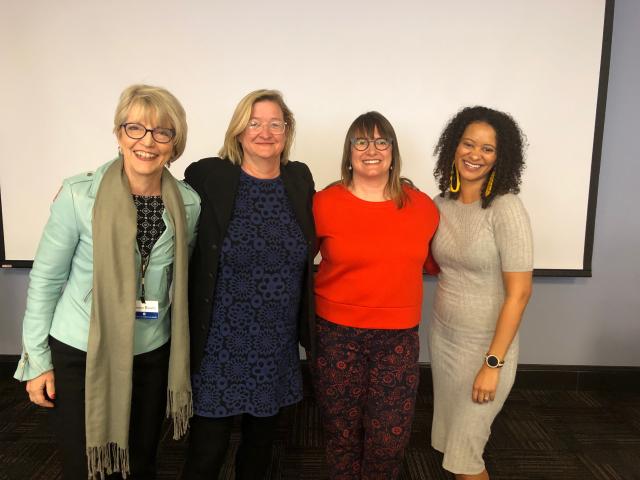Feminist DH@UVA II: Intersectionality and Doing Justice To/With Data

Pictured (from left): Alison Booth, Professor of English and Academic Director of Scholars' Lab; Elizabeth Losh, Associate Professor of English and American Studies at William & Mary; Jacqueline Wernimont, Distinguished Chair of Digital Humanities and Social Engagement and Associate Professor of Women's, Gender, and Sexuality Studies at Dartmouth College; and Catherine Knight Steele, Assistant Professor in the Department of Communication at University of Maryland and Director of the African American Digital Humanities Initiative (AADHum); not pictured, Marlene Daut, Director of the Woodson Institute and Associate Professor in African and African American Studies at UVA
Feminist DH@UVA II: Intersectionality and Doing Justice To/With Data
What is the nature of data? How do cultural and societal forces shape our understanding of what constitutes data and the ways we deploy it? Whom and what must we consider if we are to expand and deepen our understanding of data and the information systems they ultimately construct? These questions and more served as topics of exploration at “Feminist DH@UVA II: Intersectionality and Doing Justice To/With Data,” a symposium of feminist scholars engaged in the digital humanities.
The event took place on Friday, March 29, 2019 at the UVA Scholars’ Lab and it highlighted the myriad ways in which data and technology advance the study of gender’s influence on society. Invited speakers hailed from Dartmouth College, the University of Maryland, the College of William and Mary, and the University of Virginia. The conference organizer, English Professor Alison Booth, Academic Director of the Scholars’ Lab, spoke of the “widespread effects of generosity,” specifically that of co-sponsors, UVA’s Department of Women, Gender, and Sexuality, the Carter G. Woodson Institute, and the English Department, and the speakers, distinguished leaders of feminist and African and African American studies in the field of digital humanities. Generosity, too, is the spirit of intersectional feminist DH, she said, as the event’s speakers already collaborate in their research initiatives.
Held in Alderman Library, Room 421, the day’s events began with a presentation by Marlene Daut, Associate Professor and Associate Director of the Woodson Institute, entitled “Digital Print Culture and Accessibility: the Case for Haiti.” Daut deplored the erasure of Haitians’ own historical scholarship and print culture, even as recently as the major exhibit on Haiti at the British Museum in 2018. Collaborating with various digital projects to edit and share rare materials such as the Haitian Declaration of Independence, Daut noted the difference between decolonizing and democratizing; for the Haitian public, a printed book may be cheaper and more accessible than a digital archive.
Elizabeth Losh, Associate Professor of English and American Studies at the College of William and Mary, led a discussion tackling the collision of gender and technology in the 2016 United States presidential election. Losh argued that Hillary Clinton’s stunning defeat in the election could be attributed, in part, to gendered notions of technology and privacy as they relate to the former Secretary of State’s usage of a private email server while leading the State Department. Losh also contended that Donald J. Trump’s usage of emojis in tweets (as well as that of his followers) could serve as a useful tracking mechanism for his performance of masculinity as a presidential candidate.
In the following session, “My Feminism is Black and Digital,” Catherine Knight Steele of the University of Maryland defined digital Black feminism, extending the research of her doctoral dissertation, “The Digital Barbershop” into the arena of the beauty shop. Steele asserted the unique role of Black feminism, defining “Black feminist technoculture” as one that does not further white supremacist culture and is not derivative of white culture. The fourth speaker, Jacqueline Wernimont, Distinguished Chair of Digital Humanities and Social Engagement & Associate Professor of Women’s, Gender, and Sexuality Studies at Dartmouth, presented “Early Data Bodies and Anglo-American Empire,” sharing her research from her recent book, Numbered Lives. From mortality tables in plague-ridden London to early maps, pedometers, and insurance, an aesthetic control of quantified populations and national spaces has served imperial interests, diminishing lives of women and enslaved people.
The conference concluded with a lively round-table dialogue among Alison Booth and the day’s speakers, sparked by brief presentations by Allison Bigelow, Assistant Professor of Spanish, on traces of Quecha in colonial Latin American texts; Doug Meyer, Assistant Professor of Women, Gender, and Sexuality, on the framing of the mass shooting at the Pulse nightclub as homophobic, anti-Latinx, or terrorist; and James Perla, Managing Director of the Citizen Justice Initiative, Woodson Institute, on the Institute’s digital projects documenting and mapping African American histories.
